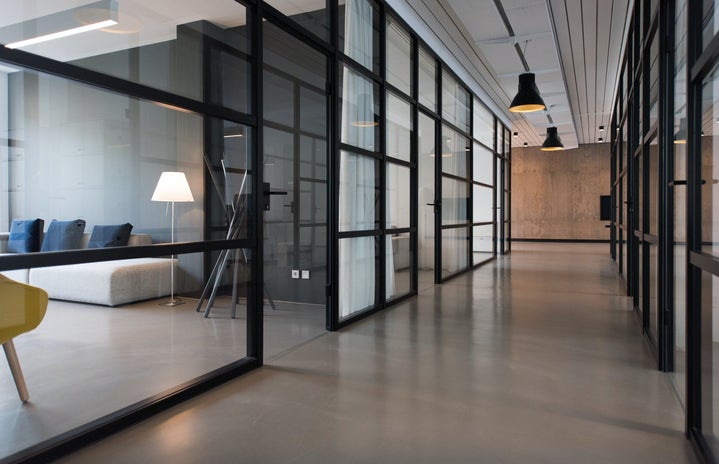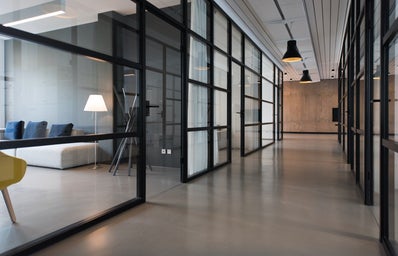Name: Abbe Wright
Age: 30
Job Title and Description: Editor at ReadItForward.com. I oversee all the editorial content on Read It Forward, a reader community owned by Penguin Random House. I conduct author interviews, write for the site and manage a team of freelancers in order to produce great content all about the ways books and reading enhance our everyday lives.
College Name/Major: Denison University/English
Website: abbewrites.com
Twitter Handle: @abbewright
What does your current job entail at Read It Forward? Is there such a thing as a typical day?
Abbe Wright: There is no typical day here at Read It Forward! Often, you’ll find me planning the site’s content in some way—whether that’s talking through pitches with freelancers or editing essays; meeting with book marketing teams to discuss how we can shed Read It Forward’s spotlight on particular titles; interviewing authors; or working with Crown’s Community Development team to plan the redesign of Read It Forward, which will launch in early 2016. And of course, on my commute to and from work, I’ve got my nose in a book!
What is the best part of your job?
AW: I’m passionate about great reads and the transformative experience a book can give a reader, so the best part of my job is helping readers find the next book they should read. Through things like our on-site recommendations in our Bookshelves section and in our podcast Book Club Appetizer, I literally get to talk about books and authors all day. Talk about a dream job!
What was your first entry-level job in your field and how did you get it?
AW: I knew I wanted to be a magazine editor from the time I was 16—I just needed to figure out how to get there. I decided that a good liberal arts foundation with a focus in English would give me good building blocks, so I chose Denison University in Granville, Ohio. During my time in college, I was an editorial intern at Philadelphia Magazine and back on campus at Denison Magazine.
After graduation, I moved home to Philadelphia to job search for my dream entry-level position at a magazine. While I searched, I worked two “in-the-meantime jobs”—one at a travel company where I created some magazine-like marketing materials and another in fashion retail—neither of which I could see myself in long-term, but they served as more building blocks to help me build skill sets I’d need in the working world.
Finally, my big break came—in the form of an unpaid internship in Teen Vogue’s fashion closet. While I was there, I worked incredibly hard and showed my talents to editors—not in a flashy, look-at-me way, but in a reliable and forward-thinking way. When they needed something, I was either there at the ready, or had already thought of it. Sorting through racks upon racks of clothing gave me insight into all the choices editors have before them and what a massive job it is to curate and style the photo that appears in the magazine. Running errands all over New York City—to Wolford for black tights, to Prada with high-level returns that couldn’t risk being messengered—was my introduction to New York, and I learned the city quickly.
While I was interning at Teen Vogue, a junior fashion writing position opened and I asked Jane Keltner de Valle, the senior fashion news director at the time, if I could throw my hat into the ring. I did an edit test and while she later said I wrote beautifully, they ended up promoting from within. When I learned that the editor-in-chief’s assistant had landed the job, I asked to be considered for the soon-to-be vacant position of Amy Astley’s assistant. I met with Condé Nast HR and later with Amy herself, and while I didn’t get that position, Condé Nast HR remembered me and called me four months later when another editor-in-chief was looking for an assistant. I interviewed, was offered and accepted the position as the Assistant to the Editor-in-Chief of Modern Bride, Elegant Bride and Your Prom and finally began my editorial career exactly one year after I graduated.
This long-winded story is meant to illustrate a few things:
- It does take a while to get that first dream job.
- While interning, you need to be vocal about where you’d like your career to head. You never know where it may lead.
- Stay hungry—always be looking for the next opportunity.
What is one thing you wish you knew about the editorial or media industry when you first started out that you know now?
AW: I wish I knew how small the industry really is! You will run into and work with the same people over and over during your career— for example, Jane Keltner de Valle and I ended up both working at Glamour seven years after I was an intern at Teen Vogue. That’s why being genuine, nice and honest is paramount. No one wants to work with someone they’ve heard they can’t trust, and furthermore, good contacts in the industry mean you can reach out to your network when you need them, be it for a job or a recommendation, and they can reach out to you in return. Don’t gossip or be a hater—always strive to be forthright, with a great attitude to match.
Who is one person who changed your professional life for the better?
AW: Sara Nelson, who is currently the editorial director at Amazon. Back in 2011, I had been working as the Assistant to the Creative Director at O, The Oprah Magazine for a year and a half, helping with all things fashion and style, like photo shoots, casting calls and, of course, Oprah’s Favorite Things. While I loved the job, I had realized that, instead of pursing a market editor track, I wanted to write for the magazine. Sara Nelson was the books editor at O Magazine at the time and took me under her wing as I transitioned over to the editorial department. She taught me how to write a witty and concise book review, introduced me to publishing industry bigwigs and helped me recover gracefully after my recorder malfunctioned during a celebrity interview.
Most importantly, she trusted my taste in books and was always eager to see me succeed. To this day, she still champions me whenever she can and I am indebted to her for getting me launched into the world of book editorial and publishing, as it has markedly changed the direction of my career for the better.
You’ve worked on the print side of media as well as the digital side. Do you have any advice for college women who are choosing between the two?
AW: What a good question! Having just transitioned to a full-time job in digital, this has been on my mind a lot in the past six months. The education I received from print magazines has been vital to my success as a journalist. In print, you need to be able to write to fit a certain word count. When the layout is set and your words are running eight lines over, it can be a maddening game to make it all fit into the allotted space, but that only makes you a better editor in the long run. Also, with print, there is a level of perfection that has to be achieved—when it goes to the printer, that’s it, that’s how it will appear on newsstands. Always holding yourself to that level of perfection is a challenge, but it makes you deliver your best work and stop and fix something if it isn’t right.
On the web, you don’t have as many space constraints and you can always go back and fix a typo that you didn’t catch. But some freedoms on the digital side that I love are getting instant feedback from readers in the form of comments—no more waiting for a reader letter! You can also be more experimental by trying new things and seeing how they perform. If it doesn’t work, no worries—it’ll be buried in “Older Posts” in no time. My skill set has grown immensely from my six months in digital—I’m now fully conversational in Adobe Analytics, Photoshop, WordPress and even Scrum, a methodology for collaborating to build software—and I’m all the more marketable with these things on my résumé.
My advice would be to try to get experience in both print and digital. They represent completely different ways of thinking about and presenting the written word to the consumer and they both have value and will teach you different things. I will say, though, that it is probably easier to go from print to web than it is the other way around.
What is one mistake you made along the way and what did you learn from it?
AW: I have let my personal feelings for someone affect the way I performed my job. After a long time of not feeling heard or supported by my boss, I spoke rashly and without thinking, which got me into hot water. Try to remember, especially if you’re frustrated with a superior, to not take things personally and let as much roll off your back as possible. And then, take a moment for a deep breath before you speak.
What has been the most surreal moment of your career thus far?
AW: I have to say, I’ve had a lot of surreal moments in my career—from hanging with fashion designer Prabal Gurung in his studio to dressing models like Ali Michael backstage at fashion week, from meeting incredible authors like Salman Rushie and Elizabeth Gilbert to delivering a cake to Mick Jagger himself—it’s been a blur of amazing experiences and cool people.
But for me, the best moment was when Oprah was in the office at O Magazine and came behind my desk, put her hand on my shoulder and asked me what I was reading. That’s definitely a highlight.
What advice would you give to a 20-something with similar aspirations?
AW: Do your research. There is nothing you can’t find out on the Internet these days (I sound old, I know), so take advantage! Interested in publishing? Then look up all the different jobs that make up “the publishing world.” For instance, do you want to be in magazine publishing or book publishing? At a magazine, the roles of managing editor, copy editor and market editor are very different and require varied skill sets. In book publishing, you could be an editor, marketer, publicist or in production. Research what the jobs are and get some internships in those before graduation—that way you can whittle down the possibilities to explore in your job search.

